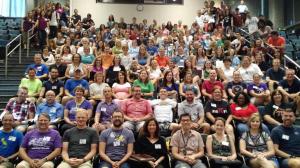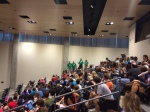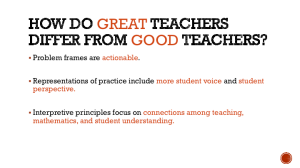If ever there were a group of passionate math educators (teachers, coaches, professors, researchers) that I call my tribe, it’s those of the MTBoS. This tribe is large, virtual, and pulses with causes greater than the individuals that comprise it. A few hundred members of the MTBoS, including me, convened at TwitterMathCamp15 at beautiful Harvey Mudd College in Claremont, CA to rub elbows. It’s the fourth year in a row that Twitter Math Camp has happened. It’s like the Justice League gathering to fight crime, except there are no capes, no egos, just math junkies laser-focused on teaching and learning. And a lot of nerdy T-shirts. The super powers here are sharing, reflecting, and the humility that comes from understanding our own shortcomings. The villains are Sucky Teaching, Clunky Curriculum, and other Diabolical Mechanisms that sabotage math classrooms. Nearly two weeks removed from the end of TMC15, here’s what stills resonates.
Thursday 7/23
Desmos
Several terrific-sounding morning sessions were offered that spanned the 3-days. These were opportunities to focus on one topic for an extended period of time. I chose Going Deeper with Desmos. My Desmos knowledge pales in comparison to the session leaders, Jed Butler, Michael Fenton, Bob Lochel, and Glenn Waddell. They did a fantastic job inspiring us to learn more, create, and share. Here they are in their green Desmos T-shirts.
These guys can tackle any issue. Beside playing for hours with Desmos, getting a cameo appearance by Eli Luberoff, we got to hear about the newly launched Activity Builder. It allows teachers to create their own classroom activities. Another game changer. I’m blown away by the teacher-responsiveness of the Desmos team. They are truly a “yet” company. Their response to a feature that teachers request is usually “not yet, but we’re working on it.
Llani Horn gave a powerful keynote with some insight into her research: Growing our own practice: How mathematics teachers can use social media to support ongoing improvement. I regret not meeting Llani in person. Next time.
This slide spoke to me, especially the first point.
The first bullet point refers to teacher agency. Instead of talking about the problems that exist in our classrooms like we’re hand-cuffed, how can we speak in actionable frames? Great teachers do that. It’s a trait that distinguishes them from good teachers. Good teachers might frame a problem in a way that is unproductive (“students are lazy”), whereas great teachers frame the problem in a way that is actionable (“students need to improve their study skills”). Here’s a growing crowd-sourced document of Making Problem Frames Actionable. Thoughts lead to attitudes. Attitudes lead to action.
I finished the day with two excellent sessions that I plan to draw upon this school year:
Using Scratch to Explore Geometry by Dan Anderson. Dan’s session rocked. It was a mixture of coding inspiration and a challenge to make geometry class more interesting.
Socratic Seminars in Math Class by Matt Baker. Matt carried his session like an old pro, walking us through the nuts and bolts of a Socratic seminar. I can’t wait to do this in my classroom.
Friday 7/24
Christopher Danielson‘s keynote pulled on my heartstrings. Two simple commands:
“Find what you love. Do more of that.”
So simple and yet so elusive. Years of attending to the priorities of others can wear down a teacher’s ability to feel. It’s easy to turn into a robot. It’s easy to rely on procedures, to wait for a script, to allow islands of student knowledge remain unconnected by the bridges we can help them build. It’s much harder to judge the situation and decide if it’s what you love. Thanks, Christopher, for this reminder to do more of what I love.*
I finished the day with this fine slate of sessions:
A Full Scale Math Debate: Using a Debate as a Summative Assessment by Chris Luzniak. Chris actually had us debate! I could see my students dig this.
Understanding our World Beyond the Numbers: Insights of Teaching Math for Social Justice by Rachel Bates. This is a conversation that needs to be had more often by all of us.
Saturday 7/24
Fawn Nguyen anchored the last day’s keynote. She delivered. Part 1 & Part 2. Pretty much she roasted the audience, brought us to tears with laughter, then brought us to tears with her stories. Timon, one of the many cool Canadians to attend TMC, summed it up perfectly:
At first I had tears in my eyes because @fawnpnguyen was so funny, now it’s because she’s so awesome. #tmc15
I learned three things from Fawn’s talk. 1) Fawn has ridiculous comedic timing, 2) She is a wise woman, and 3) She tells other people “Nobody cares” too. Whew.
I finished my afternoon attending Alex Overwijk‘s Teaching in a Vertical Classroom. This guy is a dynamo who has implemented Peter Liljedahl‘s visibly random grouping and vertical non-permanent surfaces with tremendous success.
TMC15 lived up to the hype. I learned. I reconnected with tweeps I meet two summers ago in Philadelphia. I met fabulous new tweeps. The conversations in between sessions and over meals were priceless.
Sean Sweeney hitched a ride with me down to San Diego to see his sister and her family. We spent time discussing TMC15. He read off the growing list of tweets in the #1TMCthing hashtag. It was awesome to hear them as they filtered in. I dropped him off, knowing that I may or may not see him at TMC16 in Minneapolos next summer (7/16/16-7/19/16). But that’s okay, because I know that he’s only one tweet away.
Curious to read about the TMC15 experience of others? TMC15archive
*On the boardwalk of San Diego there’s a guy named “Slomo” who found what he loved. Watch the documentary made about him. It has nothing to do with math but everything to do with following your heart.




I attended John Scammell’s morning sessions and came out with a lot of solid ideas on formative assessment — something I didn’t do enough of and that needs to change. But many of us felt we needed to clone ourselves to attend all the sessions. Reading your reflection (and others’) only confirms this.
This is what I care about: mussels. In white wine with tons of shallots and garlic. With lemongrass. (#TMC16)
Thank you for this “… the humility that comes from understanding our own shortcomings.” And thank you for spending time with me at camp, John. Your friendship is worth a margarita.
If only we could clone ourselves for all the sessions. I’m forever grateful for the wiki and the links others have shared. I’ve shared John Scammell’s ideas on formative assessment a bunch too! The cool accent didn’t come through though. When you showed your Canadian geography quiz slide, I slumped, knowing that about 15 minutes prior I had admitted to John my lack of Canadian geography and I thought I was about to be put on blast during your talk, for the second time. Thank you for your friendship, Fawn. You can have all the mussels for yourself.